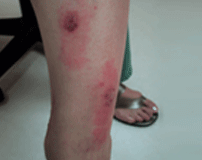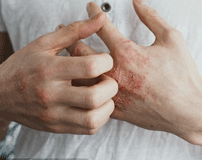



Eczema, a form of dermatitis, is an umbrella term for a range of conditions that cause red, itchy and inflamed skin. It is not contagious; rather, it results from a combination of genetic and environmental factors such as stress and prolonged exposure to an irritant. Eczema treatment is prescribed depending on its type, cause and symptoms manifested.
There are several forms of eczema, including:
Eczema affects both children and adults, but it is found to be more common among the Chinese and Malays than other races. In Singapore alone, one in five school-age children has eczema. In 50% of patients, eczema developed before the age of 10.
Eczema can be attributed to a combination of factors such as:

Eczema

Eczema
Eczema is typically characterized by:
These symptoms are long-term in nature and they may recur after a period of apparent recovery. It is recommended that you see your eczema doctor in Singapore to discuss possible treatment methods that suit you best.
Eczema may also trigger a set of complications, such as:
Eczema is a chronic skin condition with symptoms that may subside and recur. As of this time, there is no cure for this disease. However, eczema treatments help patients better manage symptoms and prevent them from worsening, as well as reducing recurrence rates and flare-ups. Common eczema treatments include the following:
If home eczema treatments prove to be insufficient to provide relief, the eczema doctor in Singapore may prescribe medications, which include:
Along with medications, eczema treatments in Singapore involve therapies, which are also effective in reducing symptoms and frequency of flare-ups.
In some cases, bio-feedback and relaxation training are used to help the patient manage eczema symptoms more effectively. These are especially beneficial to reduce stress and the urge to scratch the skin.
At the moment, there is no cure for eczema. However, eczema treatments and lifestyle modifications play a key role in keeping it under control. Here are some tips which can be done at home: